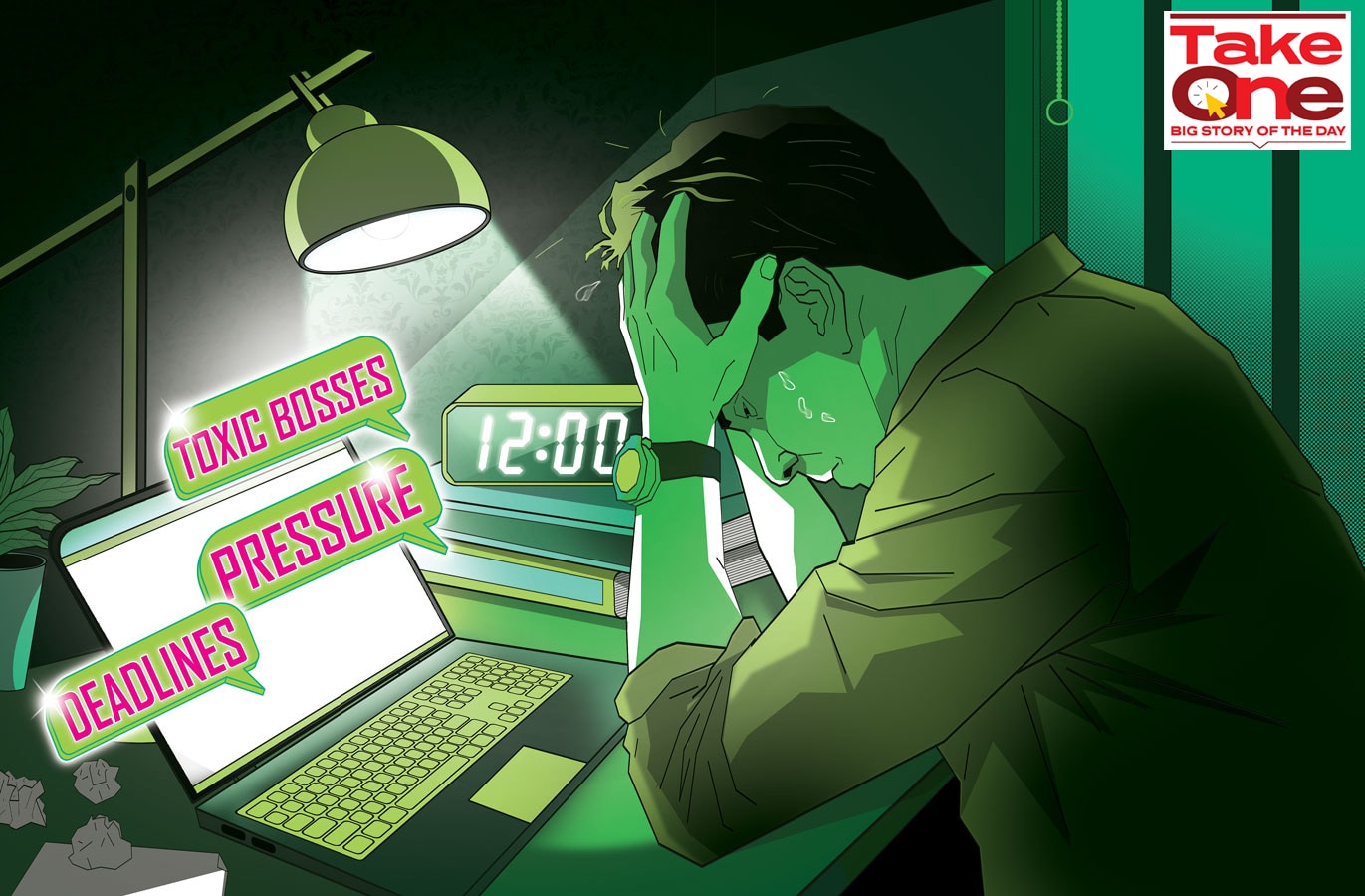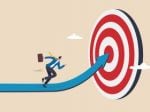Inside the mind of a workaholic
Workaholics Anonymous, a US-based organisation, which has more than half of its meetings online, has a small but increasing number of Indian members
 Workaholism or work addiction is not recognised as a formal disorder—meaning, doctors cannot clinically diagnose it.
Illustration: Chaitanya Dinesh Surpur
Workaholism or work addiction is not recognised as a formal disorder—meaning, doctors cannot clinically diagnose it.
Illustration: Chaitanya Dinesh Surpur
Rahul* had forgotten what it felt like to wake up because he rarely, if ever, truly slept.
When the Bengaluru-based executive coach turned 40 in 2019, he set an unrealistic goal for himself: To become glitteringly successful. To that end, he became an independent consultant and began chasing and closing multiple deals. “I kept pushing myself,” says Rahul, who is a member of Workaholics Anonymous (WA).
In a desperate attempt to control the situation, he even resorted to taking anxiety and sleep medication but things continued to spiral out of control. Work addiction has a catastrophic effect on families, and Rahul’s family bore the full brunt of it. He constantly argued with his wife who worried that he was stressed. “But I justified the imbalance by thinking that my goal was to become successful.”
Isolated, he barely spoke to her, his friends, mother, brothers and—it visibly hurts him to say this—his daughter. “Once, when we celebrated my wife’s promotion at work, my daughter was in tears. When I asked her what happened, she replied, ‘Now, mom will be busy too’. That hit me hard.”
It all came to a merciful end when he decided to exit from the deals. “I realised that I lacked the maturity and bandwidth to pull it off.” He was relieved for one short day, but then quickly plunged into depression. It took him about two months to recover.
Rahul felt the whole episode torpedoed his career, but it also forced him to confront, for the first time in his life, his unhealthy obsession with work and dangerous tendency to seek validation from it. “I realised that I fill my days with tasks,” he says. “I commit too much and then get myself into a place of crisis.” He didn’t enjoy his work and was, instead, driven by fear.
While searching for help online he discovered the recovery community Workaholics Anonymous (WA), which began in the 1980s in the US. It functions like Alcoholics Anonymous, where members attend meetings, work the 12 Steps with the guidance of a sponsor and lend their support to other members as well.
There are currently 139 WA meetings, out of which 91 are online—this has made the community more accessible to members like Rahul, who live outside the US. “Some meetings were online before too, but the Covid-19 pandemic inspired the transition to having more WA meetings online,” says a member of the Workaholics Anonymous Board of Trustees. “And while there are probably under 50 WA members in India currently, I do see the number growing.”
On its WhatsApp group, members from across the world can make “outreach calls” in case someone needs help. “We have a tendency to overwork and crash. So, it’s a bit like having a therapist on tap,” jokes Rahul.
When we chatted on Google Meet, Rahul had just finished attending a meeting online. He also has regular 45-minute sessions with his study partner in Europe and quotes easily from the WA literature when we discuss the difference between a workaholic and a hard worker. “Workaholism doesn’t have anything to do with the volume of work,” he explains. “It’s about the unhealthy relationship that people develop with their work and how they derive their self-worth from it.”
He believes the fact that he experienced abuse as a child and was raised by a family that prioritised tangible success above all else contributed significantly to his workaholism. “I had a tendency to do well but I felt like I had to compensate for not being good enough.”
When compared to other addictions like alcohol and drug addiction, where there is a visible villain, work addiction is a different beast altogether. It takes some understanding to recognise when a person begins to use work as an addiction. “This is the only behavioural addiction that is socially sanctioned and rewards you with promotions at work, money and success,” says Rahul. And part of the struggle stems from that: How can one recover in a hypercompetitive society?
Also read: How to combat an "always on" work culture
The psychology behind workaholism
Workaholism or work addiction is not recognised as a formal disorder—meaning, doctors cannot clinically diagnose it. “There is no formal diagnosis in the Diagnostic and Statistical Manual of Mental Disorders, Fifth Edition, Text Revision (DSM-5-TR) which is followed by clinical psychologists and psychiatrists,” explains clinical psychologist and author Seema Hingoranny. “But we don’t only deal with clinical diagnosis—we deal with personality issues as well and this is an extreme addictive personality trait which could be trauma-induced or due to conditioning within the family.”Most patients don’t even realise they are workaholics. “They come to us for other issues like a dysregulated nervous system, relationship issues or chronic fatigue syndrome and burnout,” says Hingoranny. Follow-up questions about their lifestyle reveal unhealthy patterns where patients immerse themselves in work so much that they can barely stay afloat and breathe. “They prove themselves at work by numbing their nervous system with work,” she says.
Natasha*, another WA member who also struggles with relationship addiction or co-dependency, once found it impossible to stop herself from cleaning the kitchen cabinets at midnight. It was the only chore that was left on her exhausting to-do list, but it bothered her so much that it kept her awake. In retrospect, the Delhi-based dentist understands that it was a sign of how bad her work addiction had gotten. She had always struggled with tearing herself away from work, but until that night, she had just assumed that she was a ‘perfectionist’.
Natasha says that her crumbling marriage intensified the signs of her workaholism, and that she had an overwhelming desire to control other areas of her life. “I would yell at people and make to-do lists for Sundays, so that I would remain busy the whole day,” she says. “I was exhausted, frustrated, irritated.” Even when she smiled, she could feel the tension coil around her body like a serpent. “I don’t think workaholism is limited to only those who work in offices—even a homemaker can be a workaholic.”
She gives us some insight into how a workaholic’s mind functions. “When you are not working, you feel like you are cheating. You stop spending time with your family and friends and you just keep working to feel worthy.” Her body tingled with anxiety every time her phone beeped with a new message or email and she felt like she had to reply within seconds, as if her life depended on it. “Your work becomes your alcohol. There is a deep-rooted fear of losing an opportunity, and that you are not good enough.”
A toxic work culture
A popular inside joke at Rahul’s first job was that the bosses were ‘married to their laptops’. Not to be outdone, Rahul constantly pulled all-nighters. “I remember my boss once sent a poem of sorts as a group email to appreciate me,” he chuckles.Promotions came fast and quick and he felt like he’d cracked the secret code to success. But after his third promotion, he began to flounder. He often cried alone in the company’s dorms and watched porn at home to escape, but that too developed into an addiction.
Akshay Verma, the Delhi-based co-founder of FITPASS, an entrepreneur and a member of the CII Regional Special Task Force on Entrepreneurship and Start-ups, explains that his experience as an investment banker in the US and UK taught him that companies abroad are more performance-oriented. “The hours could be whatever it takes you to perform well, like 8 hours or 12 hours. So, the hours don’t matter but performance is key.” And although Indian organisations operate in a similar manner, they still tend to be hierarchical and focussed on the number of hours an employee puts in at work, says Verma, while also pointing out that workaholism is a nuanced issue and that there are multiple reasons for it.
Dr Anjali Chhabria, psychiatrist and director of Mind Temple Institute agrees that the work culture in India encourages such unhealthy behaviour. “I remember a corporate employee once asking me, ‘But how can I leave the office?’. Turns out, there was one person who would leave on time but the rest had some sort of competition to see who would leave last and that person would be the blue-eyed boy of the boss.”
Workaholics are often trapped in a vicious cycle where they relentlessly set goals for themselves. “Every time they reach their goal, like making a certain amount of money or buying a house, they have a new goal at hand,” she says. It’s a silent killer where the repercussions are not immediately obvious unlike other addictions but can ultimately cause a host of emotional, mental and even physical issues like hypertension and heart attacks. “And in a developing country like India, where you are expected to work hard if you want to be successful, it has been normalised. People think that if you are a good person, you will be addicted to your work,” she says.
Also read: Workaholics don't derive pleasure from their work, study says
The slow path to recovery
Natasha, who has tried everything from self-help books to attending lectures, says WA has helped her to realise when her body begins to revert to old habits. She no longer lunges at the mobile when it beeps. “Now, I take a pause instead,” she says. “I keep my mobile aside after 8 pm and pick it up only at 9.30am.”“It’s a slow and healing process. I practise mindfulness and feel more gratitude,” she adds. She is much closer to her family today but the most important relationship is the one with herself. “And that love has extended to other people as well.”
Life has changed for the better for Rahul, too. Today, he “exits all screens” by 9 pm. “I have scheduled breaks throughout the day and I aim for 7 hours of continuous sleep. I also practise yoga every day and it has helped a lot.”
“I am having the best life now,” he smiles. “I know I am on the edge and that I can trip, but I am at my happiest now.”
* Name changed

















